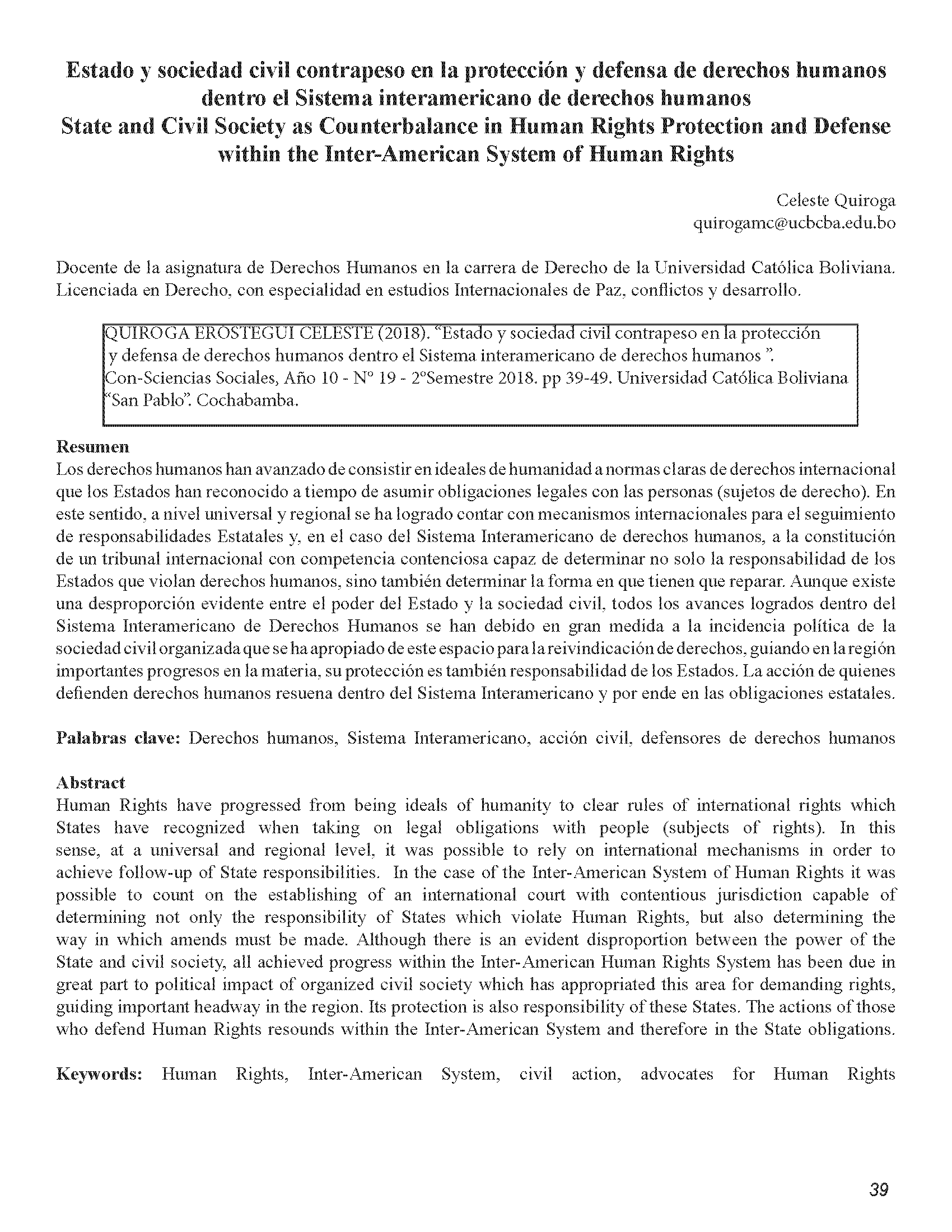State and Civil Society as Counterbalance in Human Rights Protection and Defense within the Inter-American System of Human Rights
DOI:
https://doi.org/10.35319/consciencias.20181946Keywords:
Human Rights, Inter-American System, civil action, advocates for Human Right, advocates for Human RightsAbstract
Human Rights have progressed from being ideals of humanity to clear rules of international rights which States have recognized when taking on legal obligations with people (subjects of rights). In this sense, at a universal and regional level, it was possible to rely on international mechanisms in order to achieve follow-up of State responsibilities. In the case of the Inter-American System of Human Rights it was possible to count on the establishing of an international court with contentious jurisdiction capable of determining not only the responsibility of States which violate Human Rights, but also determining the way in which amends must be made. Although there is an evident disproportion between the power of the State and civil society, all achieved progress within the Inter-American Human Rights System has been due in great part to political impact of organized civil society which has appropriated this area for demanding rights, guiding important headway in the region. Its protection is also responsibility of these States. The actions of those who defend Human Rights resounds within the Inter-American System and therefore in the State obligations.
Downloads
References
Bolivia (2009). Constitución Política del Estado. En: https://www.oas.org/dil/esp/Constitucion_Bolivia.pdf (fecha de consulta: 08/06/18)
Corte IDH. (2003). Sentencia de 28 de febrero de 2003, caso de los “Cinco Pensionistas” vs. Perú. San José de Costa Rica : Corte Interamericana de Derechos Humaos .
Martin, C. (2004). La Corte Interamericana de Derechos Humanos: Funciones y Competencia. In C. Martin, D. Rodriguez-Pinzón, & J. Guevara, Derecho Internacional de derechos Humanos (pp. 200 - 277). México.
Mendez, F., & Pizarro, A. (2006). Manual Iternacional de Derechos Humanos. Panamá: Universal Books.
OEA (1948) Carta de la Organización de los Estados Americanos. Bogotá. En: http://www.oas.org/es/sla/ddi/tratados_multilaterales_interamericanos_A-41_carta_OEA.asp (fecha de consulta: 06/06/18)
OEA (1948) Declaración Americana sobre los derechos y deberes del hombre. Organización de Estados Americanos. IX Conferencia Internacional Americana. Bogotá. En: http://www.oas.org/es/cidh/mandato/Basicos/declaracion.asp (fecha de consulta 05/06/18)
OEA (1969). Convención Americana de Derechos Humanos (Pacto de San José de Costa Rica). San José de Costa Rica. En https://www.oas.org/dil/esp/tratados_b32_convencion_americana_sobre_derechos_humanos.htm (fecha de cosulta: 11/06/18)
ONU (1945). Carta de Naciones Unidas.Asamblea General de Naciones Unidas. San Francisco
ONU (1948). Declaración Universal de los Derechos Humanos. Asamblea de Naciones Unidas. Nueva York
Palenzuela, D. L. (1984). Una evaluación de la indefensión aprendida: crítica a la reformulación de Abramson, Seligman y Teasdale. Análisis y Modificación de Conducta, 10(26), 483-512. DOI: https://doi.org/10.33776/amc.v10i26.1679
Quispe, F. (2017). La protección de los derechos humanos en el Sistema Interamericano: su evolución y una visión actual.
Quiroga, C. (2016). Trabajo final de Master Universitario en Estudios Internacionales de Paz, Conflictos y Desarrollo. Guía para la defensa colectiva de derechos humanos.La libertad de asociación desde la sociedad civil organizada. Universitat Jaume I Castellón de la Plana, Comunidad Valenciana - España. En:http://repositori.uji.es/xmlui/discover (22/11/2018).

Downloads
Published
How to Cite
Issue
Section
License
Copyright (c) 2018 Revista Con-Sciencias Sociales

This work is licensed under a Creative Commons Attribution-NonCommercial 4.0 International License.









